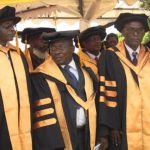Masters of Education in Curriculum Design and Development (MED CDD)
The Masters in Curriculum Design and Development is a new programme to be offered by the Open University of Tanzania (OUT) through collaboration with The Tanzania Institute of Education and UNESCO (mainly represented by the International Bureau of Education, Regional Bureau for Education in Africa, the Teacher Education Section).
The programme is hosted by the Open University of Tanzania under the regulations that established OUT in 1992 by an Act of Parliament as a public institution of higher education, and accredited by the Tanzania Commission for Universities (TCU) under the Universities Act of 2005. In compliance with quality assurance regulations of the Inter-University Council of East Africa (IUCEA), the Programme is aimed at strengthening capacities among the stakeholders in education and training provision, management, research, monitoring and evaluation.
Specifically, the programme, at the different exit levels, targets curriculum developers, teacher educators, graduate serving teachers, school inspectors, examination officers as well as educational planners and policy makers at local and regional level; for the purpose of enhancing their competencies in understanding, leading, researching, planning, designing, implementing, monitoring and evaluating the curriculum and decision making about curriculum and education in general.
Programme Summary
Course Name: Master of Education in Curriculum Design and Development
Course Initials: MEDCDD
Duration: Minimum 2 Years-Maximum 4 Years
Total Units: 18
Mode of Delivery: Blended
Programmes Informations
A candidate should have at least a first degree or its equivalent, or Postgraduate Diploma in Curriculum Design and Development (PGDCDD) and a teaching experience of at least 3 years in the relevant field. The minimum GPA qualification is 3.0 (Using OUT degree classification system).
| CODE | TITLE | UNIT | CREDITS | STATUS |
| Trimester I | ||||
| OEI 621N | Curriculum Development Process | 2 | 20 | Core |
| OEI 622N | Curriculum Design Approaches and Models: Trends in the National and International Contexts | 2 | 20 | Core |
| Trimester Il | ||||
| OEI 623N | Curriculum Implementation Process: Management and Governance | 2 | 20 | Core |
| OEI 624N | Research Methodology in Curriculum Studies | 2 | 20 | Core |
| Trimester Ill | ||||
| OEI 628N | Policy Dialogue and Formulation for Curriculum Development | 2 | 20 | Core |
| OEI 625N | Development and Use of Teaching and Learning Materials | 2 | 20 | Elective |
| OEI 626N | Curriculum Quality Control and Assurance | 2 | 20 | Elective |
| OEI 627N | Assessment of Teaching and Learning | 2 | 20 | Elective |
| OED 699 | Dissertation | 6 | 60 | Core |
| TOTAL |
Note: A student is supposed to take ALL CORE COURSES and ONE elective.
Fee structure
Table 1: Fees for Postgraduate Diploma and Masters Programmes by Coursework and Dissertation (Unless Otherwise Stated)
Description | Local (Tsh.) | EAC/SADC (USD) | NON-SADC/EAC (USD) |
Registration fee | 50,000 | 100 | 100 |
ID processing | 20,000 | 20 | 20 |
Student Organization fee (paid annually) | 20,000 | 20 | 20 |
Quality assurance fee (paid annually) | 20,000 | 20 | 40 |
Coursework Examination fee per paper | 20,000 | 40 | 60 |
Plagiarism fee | 20,000 | 20 | 20 |
B: Mode of Study and Tuition Fee per Unit (I Unit = 10 Credits)
Table 2: Unit Tuition Fee for Taught Masters Programmes
S/N | Mode Of Delivery | LOCALS (Tsh.) | EAC/SADC (USD) | NON EAC/SADC (USD) |
1 | All delivery modes (evening, executive and blended) | 180,000 | 100 | 200 |
2 | Facilitation fee | 50 | 50 | |
3 | Dissertation fee | 180,000 | 100 | 200 |
C. Other recommended direct student costs (incurred by student/sponsors) are as tabulated below:
Local Participants | Other countries | |
DESCRIPTION | Tshs. | USD |
Books | 250,000.00 | 300 |
stationary | 50,000.00 | 100 |
Independent study/research | 3,000,000.00 | 1,500 |
Thesis/dissertation production | 100,000.00 | 150 |
Total direct cost students | 3,400,000.00 | 2,050 |
D. Other recommended direct student costs (incurred by student/sponsors) are as tabulated below:
Local Participants | Other countries | |
DESCRIPTION | Tshs. | USD |
Books | 250,000.00 | 300 |
stationary | 50,000.00 | 100 |
Independent study/research | 3,000,000.00 | 1,500 |
Thesis/dissertation production | 100,000.00 | 150 |
Total direct cost students | 3,400,000.00 | 2,050 |
| s/n | Full name | Contact |
| 1 | Dr. Jesse Lukindo | jesse.lukindo@out.ac.tz +225768105555 |
| levels | UQF 9 | |
| LEARNING OUTCOMES | Knowledge | By the end of the programme the graduate should be able to, a) Demonstrate an understanding of curriculum concepts, theories and issues. b)acquire professional skills as trainers in curriculum matters c) demonstrate competencies in educational leadership, research methodology, monitoring and evaluation |
| Skills designing | By the end of the programme the graduate should be able to , Design programmes of instruction based on modern approaches to curriculum development and cross-cutting issues. | |
| competencies | a) Explore and use pedagogical knowledge and skills, didactics and reflective practices in the teaching and learning of subjects within inclusive educational settings. b) design and carry out action research to support curriculum design and development c)conduct monitoring and evaluation for improvement of teaching and learning process d)Lead and supervise curriculum processes including decision making about curriculum resources. |
MEDCDD (Coursework & Dissertation) courses shall be examined during the academic year in which they are studied. The assessment will comprise course work and annual examinations.
Course work assessment shall consist of an online coursework assessment Online MOODLE coursework assessment which will contribute to 30% of each course. Annual examinations; each student shall be required to sit for a three-hour annual examination, at the end of the academic year. The annual examination will contribute 70% to the total mark of each course. The combination of both coursework and annual examination shall be100%.
Each candidate shall be required to register for the examinations in specific subjects at least one month at latest, before the commencement of annual examinations period. The annual University examinations shall be conducted under the control of the Deputy Vice-Chancellor (Academic) with the Director of the Examinations Syndicate.
The pass marks when course work and Annual examination are combined shall be 50%. Before the candidate is allowed to start writing a dissertation, he/she must successfully complete the coursework part with a mean overall grade of “B” or above in all chosen/pursued core modules listed, or as the University regulations may provide.
The mode of evaluation for the dissertation comprises 100% of the dissertation report; where the pass mark shall be 50% (d) A Candidate who fails in ONE or TWO of the THREE courses undertaken in a year shall be allowed to do supplementary examination.
A candidate who fails in a repeated subject shall be requested to pay an appropriate fee and repeat the subject. A candidate whose overall grade point is below “B” in the coursework part shall be requested to pay an appropriate fee and repeat the course.



